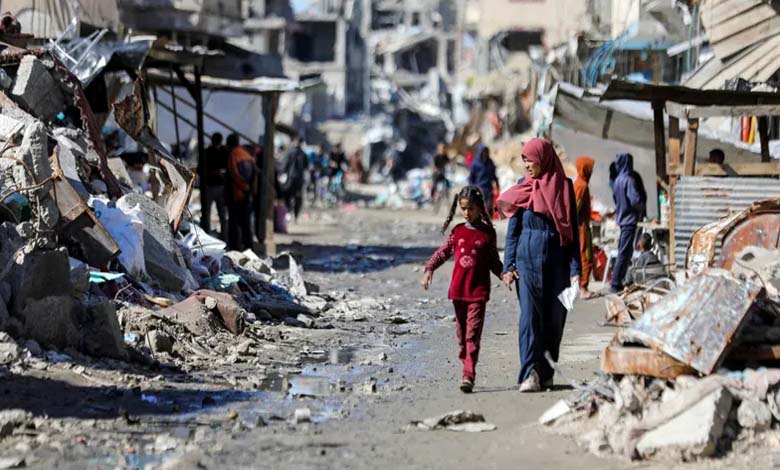Gaza Ceasefire in Its Fourth Day: Doubts, Uncertainty, and Terrifying Gaps

After months of arduous negotiations, the devastating war in the Gaza Strip has finally come to a halt under a ceasefire agreement. However, several factors are raising significant concerns.
According to Agence France-Presse (AFP), the ambiguous provisions of the agreement and the deep mistrust between Israel and Hamas are causing some observers to fear the truce might collapse at any moment.
-
Back to the Ruins in Gaza: When Rubble Becomes a Homeland and Memories a Shelter
-
Ceasefire in Gaza: Here’s the “Zero Hour”
Qatar, which mediated the talks with the United States and Egypt, expressed hope that the truce—whose first phase spans six weeks and involves the exchange of Israeli hostages held in Gaza for Palestinian prisoners in Israeli jails—could become permanent.
Nevertheless, this outcome is far from guaranteed. The start of the ceasefire itself and the first exchange of Israeli hostages and Palestinian prisoners were delayed when the agreement came into effect on Sunday.
-
Gaza Agreement: What Did the Mediators Say?
-
The Day After the War: What the Palestinian Authority Wants in Gaza
During the three-hour delay before the truce began, Gaza’s civil defense reported that Israeli airstrikes killed eight people and injured 25 others.
U.S. President Donald Trump, who took office on Monday, stated that he was “not sure” the ceasefire would hold, an assessment shared by analysts.
Anna Jacobs from the Arab Gulf States Institute in Washington told AFP, “Unfortunately, there is a significant risk that the truce will collapse, and that Israeli Prime Minister Benjamin Netanyahu will continue his military campaign in Gaza.”
-
Gaza Agreement Reaches the “Final Draft” Stage
-
Some Progress in Gaza Negotiations without Reaching an Agreement
Even Qatar, one of the agreement’s strongest supporters, acknowledged its fragility. During a press conference on Tuesday, Qatar’s foreign ministry spokesman Majed Al-Ansari warned that “any breach by either side or political decision… could clearly lead to the agreement’s collapse.”
“Divergent Interpretations”
Speaking to Al Jazeera, Al-Ansari said that the ceasefire is being monitored by mediators through an “operations room” in Cairo.
He explained that they are overseeing the delivery of aid to Gaza, the exchange of prisoners and hostages, the withdrawal of Israeli forces from densely populated areas in Gaza, and the return of displaced residents to their homes.
-
Gaza Ceasefire: “Slow” Steps Amidst Gaps and Obstacles
-
“Death Trap” in Gaza: International Report Condemns Israel’s Actions
However, Joost Hiltermann of the International Crisis Group pointed out that “the absence of an official, publicly available text of the agreement’s terms leaves room for widely varying interpretations.”
He added, “Success will also depend on mediators acting as guarantors.”
“This applies particularly to the United States, given its weight. But we all know that Trump is unpredictable and has a very short attention span,” he continued.
He questioned, “Will (Trump) seek to implement the agreement, or will he lose interest?”
-
Gaza Welcomes 2025 with “Wasted Hope”: Talks of a “Deadlock” in Negotiations
-
Collapse of Hospitals in Northern Gaza: Death Closer Than Treatment
The ceasefire stipulates a halt to hostilities for an initial phase of six weeks, during which 33 Israeli hostages will be released in exchange for 1,900 Palestinians detained by Israel.
What comes next is unclear, as negotiations for a second phase—which could lead to a permanent end to the war—are set to take place during the first phase.
Sanam Vakil, director of the Middle East and North Africa Program at Chatham House, wrote in an opinion piece: “It is important to stress that the deal is a fragile truce, not an end to the conflict.”
-
Will the Gaza War End in 2025?
-
The Countdown to Trump’s Inauguration: Gaza Truce Hopes Fade amid Rising Tensions
She added, “This will require ongoing monitoring and accountability by the negotiating parties. There will be an almost immediate need to return to the negotiating table to keep the remaining phases alive.”
“A Huge Trust Gap”
Hamas‘ attack on October 7 caused the deaths of 1,210 people, most of whom were civilians, according to an AFP tally based on official Israeli data.
In the Gaza Strip, at least 47,100 people, mostly civilians, have been killed, according to figures from Hamas’ health ministry.
-
In Jerusalem and Bethlehem… Gaza’s agony overshadows the joy of Christmas
-
Water Crisis in Gaza: Human Rights Watch Accuses Israel of Genocide
Major differences remain between the parties involved in the truce, including Israel’s demand for Hamas’ disarmament—a condition the Palestinian group is highly unlikely to accept. Meanwhile, Hamas is demanding that Israel lift its 17-year blockade of Gaza, which also seems unlikely.
Michael Horowitz, head of intelligence at the security and risk management consultancy Le Beck International, told AFP, “The trust gap between the two sides is enormous.”
He added, “The lack of transparency regarding the agreement helps Netanyahu by allowing him to claim that this ceasefire is not permanent and that Israel will be able to resume the war.”
-
Details of the “Gaza Truce”: Disputes over “Prisoners” and Flexibility on the “Israeli Withdrawal”
-
International Report: Israel’s War in Gaza is the most “Deadly and Destructive” Ever
According to Jacobs, “Netanyahu has not achieved any of his strategic goals in this war, particularly the elimination of Hamas. It is therefore difficult to imagine that he won’t find an excuse to derail the truce and continue the war.”
Netanyahu faces internal pressure, as his parliamentary majority is slim and his far-right coalition partners oppose the truce.
In this scenario, it is uncertain whether Hamas will feel confident enough to release all Israeli hostages without fearing further retaliation.
Former Egyptian Assistant Foreign Minister Hassan Haridy commented, “The main question arises after the release of hostages: Will Netanyahu continue to honor the truce?”
-
Decisive Hours: Intense Arab Efforts to End the Gaza War Quickly
-
“The Truce Crescent” Attempts to Tear the Clouds of Gaza War… Positive Expectations for a Near Breakthrough












